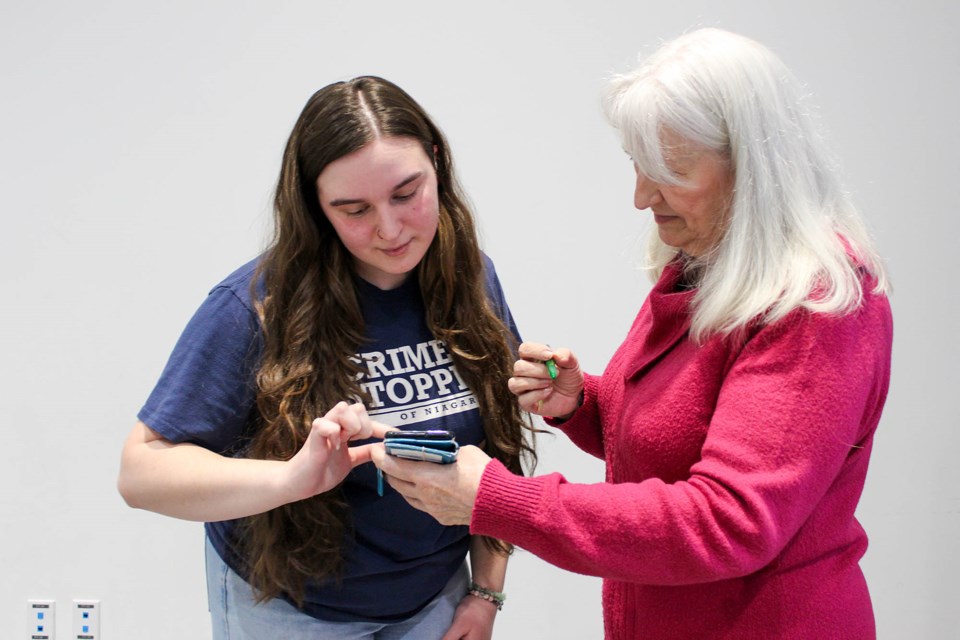As technology continues to improve and change, scams have evolved, making it harder for people to identify them.
“I get calls daily from scammers, and I just ignore them. If I don’t recognize the phone number, or the name of the person calling, I don’t answer the phone,” Ursula Hudson said.
Wanting to learn more about how to spot scams, Hudson was one of 105 Pelham residents registered to attend a free seminar on identity fraud held this Wednesday, Jan. 17, in the Accursi Room at the Meridian Community Centre.
Led by Crime Stoppers Niagara representative Brooklyn Mercer, attendees learned how identity theft happens, steps to protect themselves, and what to do after identity theft has occurred.
“I found (the seminar) very informative with a lot of interesting information,” Hudson said.
Mercer explained to the audience that identity theft is a serious crime where personal information like a person’s name, a driver’s license or social insurance number has been compromised by a scammer who intends to commit fraud.
“Scammers may use stolen personal information to access bank accounts, open new credit lines, or make unauthorized purchases leading to financial hardships for the victim,” she said, and added the impact of identity theft can be devastating.
“Discovering that your identity has been stolen can be emotionally distressing. It can lead to feelings of isolation, anxiety and stress as victims grapple with the aftermath.”
The program is part of an ongoing series organized by the Town of Pelham for seniors to learn more about fraud prevention. The funding to support the Seniors Fraud Prevention Seminar Series is provided through the Seniors Community Grant Program. The provincial grant helps to support a community organization’s ability to provide opportunities for greater social inclusion, volunteerism and community engagement for older adults.
Learning about scams ahead of time can save a potential victim tens of thousands of dollars
“It’s really encouraging to see the number of people that are attending these seminars,” Pelham’s Communications Specialist, Leah Letford, said.
The program is offered on a monthly basis and there is no cost involved for seniors who wish to attend.
Upcoming seminar topics include telemarketing and banking scams on Feb. 21, and Niagara Regional Police Services (NRPS) will provide their expertise on how to identify scams and fraud on March 20.
NRPS spokesperson Phil Gavin said identity theft is a common scam that impacts people.
“Many times the information is available online through data breaches that are posted on the dark web,” he said. “Sometimes victims provide their own private information after having been tricked by a fake text from Canada Post or Amazon that leads them to a fake website where they put in their information to prevent a purchase or arrange a delivery. These messages and websites are very realistic and this type of scam is called phishing.”
Gavin said the NRPS had more than 3,000 reported frauds last year, with total reported losses of over $25.5 million.
“However, Statistics Canada reports that only eight percent of victims of fraud report it to the police, and many people don’t report because of shame or a feeling that nothing can be done.”
According to Gavin, seniors living in Niagara reportedly lost $340,000 to emergency scams in 2023.
Gavin said it’s important to remember never to confirm personal information over the phone, always verify who is calling, don’t be pressured, ask a trusted friend or family member for advice, and when in doubt to call the police.
“Learning about scams ahead of time can save a potential victim tens of thousands of dollars by enabling them to see through the scam from the start,” he said.
Letford said there are booklets that are handed out at the seminars called ‘The Little Black Book of Scams,’ which was published by the Consumer Protection Bureau of Canada that outlines major types of scams. There are also copies available at the MCC that seniors are welcome to take.
To register for one of the seminars call Katie Kilbreath at 905-732-7871 or send an e-mail to [email protected]



